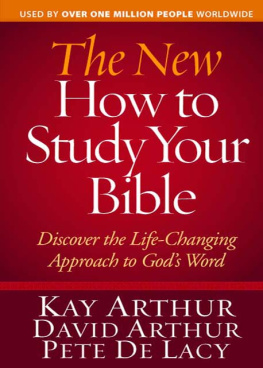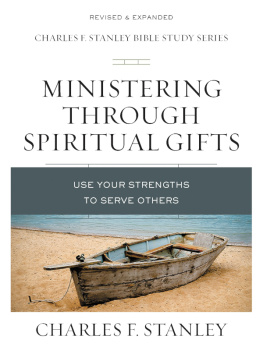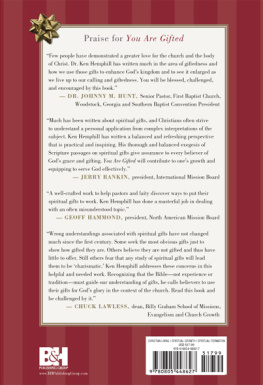HOW TO USE THIS STUDY
This small-group study is for people who are interested in learning for themselves more about what the Bible says on various subjects, but who have only limited time to meet together. Its ideal, for example, for a lunch group at work, an early morning mens group, a young mothers group meeting in a home, a Sunday-school class, or even family devotions. (Its also ideal for small groups that typically have longer meeting timessuch as evening groups or Saturday morning groupsbut want to devote only a portion of their time together to actual study, while reserving the rest for prayer, fellowship, or other activities.)
This book is designed so that all the groups participants will complete each lessons study activities at the same time. Discussing your insights drawn from what God says about the subject reveals exciting, life-impacting truths.
Although its a group study, youll need a facilitator to lead the study and keep the discussion moving. (This persons function is not that of a lecturer or teacher. However, when this book is used in a Sunday-school class or similar setting, the teacher should feel free to lead more directly and to bring in other insights in addition to those provided in each weeks lesson.)
If you are your groups facilitator, the leader, here are some helpful points for making your job easier:
- Go through the lesson and mark the text before you lead the group. This will give you increased familiarity with the material and will enable you to facilitate the group with greater ease. It may be easier for you to lead the group through the instructions for marking if you, as a leader, choose a specific color for each symbol you mark.
- As you lead the group, start at the beginning of the text and simply read it aloud in the order it appears in the lesson, including the insight boxes, which appear throughout. Work through the lesson together, observing and discussing what you learn. As you read the Scripture verses, have the group say aloud the word they are marking in the text.
- The discussion questions are there simply to help you cover the material. As the class moves into the discussion, many times you will find that they will cover the questions on their own. Remember, the discussion questions are there to guide the group through the topic, not to squelch discussion.
- Remember how important it is for people to verbalize their answers and discoveries. This greatly strengthens their personal understanding of each weeks lesson. Try to ensure that everyone has plenty of opportunity to contribute to each weeks discussions.
- Keep the discussion moving. This may mean spending more time on some parts of the study than on others. If necessary, you should feel free to spread out a lesson over more than one session. However, remember that you dont want to slow the pace too much. Its much better to leave everyone wanting more than to have people dropping out because of declining interest.
- If the validity or accuracy of some of the answers seems questionable, you can gently and cheerfully remind the group to stay focused on the truth of the Scriptures. Your object is to learn what the Bible says, not to engage in human philosophy. Simply stick with the Scriptures and give God the opportunity to speak. His Word is truth (John 17:17)!
UNDERSTANDING SPIRITUAL GIFTS
S piritual gifts are a necessity in the ministry of every body of believers. All of us, as Christ followers should be working together to strengthen the body, to produce unity, to be lights shining in the darkness, and to bring glory to God. This is done through the empowerment of the Holy Spirit, through the gifts that He gives us.
As the preacher A. W. Tozer wrote, These are not natural talents merely, but gifts imparted by the Holy Spirit to fit the believer for his place in the body of Christ. They are like pipes on a great organ, permitting the musician wide scope and ranged to produce music of the finest quality. But they are, I repeat, more than talents. They are spiritual gifts.
Unfortunately, many Christians seem to be unaware of the gifts of the Spiritwhat they are, how they are received, or how they are to be used.
In the next six weeks of study you will learn the answers to these questions and more. As you discover a fuller vision for how God intends spiritual gifts to work within the church, your study of this subject will prepare you to tap into Gods agenda and play an active role in His ministry, not only to the body of Christ but possibly even to the rest of the world.
A.W. Tozer, Keys to the Deeper Life (Grand Rapids: Zondervan, 1984), 44.
WEEK ONE
Sometimes the subject of spiritual gifts seems so confusing it can be hard to even know where to start the discussion. There are so many questions. Who has a spiritual gift? All of us? Or are they for super-spiritual people only?
To get the answers, were going to go straight to the gift giver Himself and let Him explain the gifts. As you read for yourself the straightforward truths of the Bible, we believe youll find the subject is not nearly as complicated a subject as you may have thought.
First, well consider these two questions: what kind of gifts are there, and who qualifies to receive one?
OBSERVE
Jesus prepared Peter for the worlds tribulation; then Peter was to prepare others. So the apostle wrote a letter to the chosen, the believers scattered throughout Asia during the intense persecution of their day, to encourage them and instruct them in how to live according to Gods will (1 Peter 1:2; 4:2).
Leader:Read 1 Peter 4:1011 aloud. Have the group say aloud and
draw a box around each reference toa gift,including the pronounit:
underline the phrase each one, which refers here tobelievers.
As you read the text, its helpful to have the group say the key words aloud as they mark them. This way everyone will be sure they are marking every occurrence of the word, including any synonymous words or phrases. Do this throughout the study.
INSIGHT
One way to better understand what the text is saying is by asking the 5 Ws and an H questionswho, what, when, where, why, and howabout the passage. By asking these questions, you slow down and actually see what the writer is saying.
DISCUSS
- Who receives a gift?
- What is this passage about?
- What are believers to do with the gift they have been given?
- How are they to use what theyve received?
- Is the gift to be used for ones personal benefit? Explain your answer.
- What two categories did Peter divide the gifts into?
- What are those who speak supposed to speak?
- How are those who serve to carry out their role?
- Why are we to use our gifts in the way described? Look carefully at the end of verse 11 if you need a hint.
- Now lets evaluate what you just read and see how it applies to you. Looking at your experience serving in the church and your desire to do so, which category better describes the way God has equipped you: serving or speaking?






















